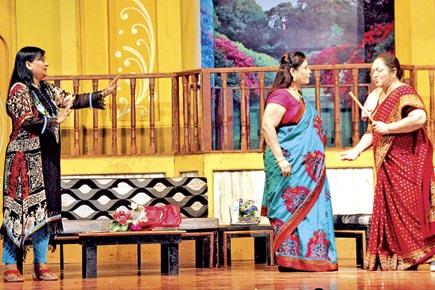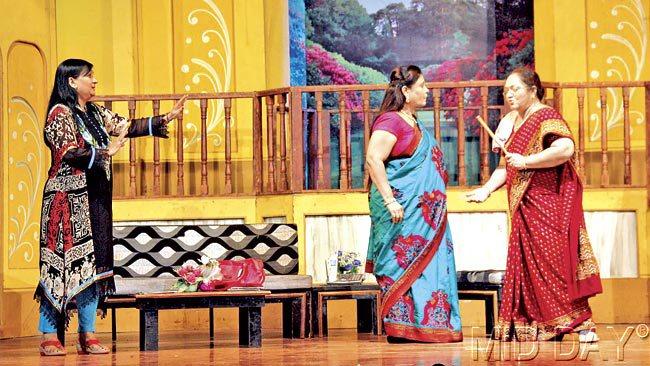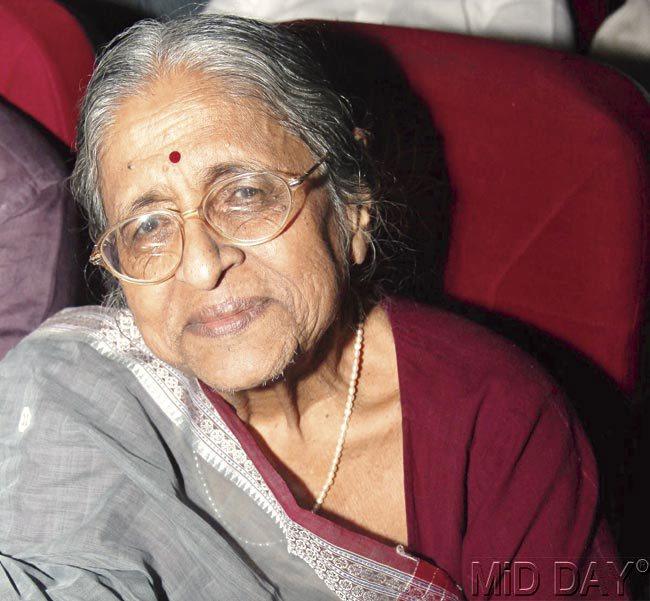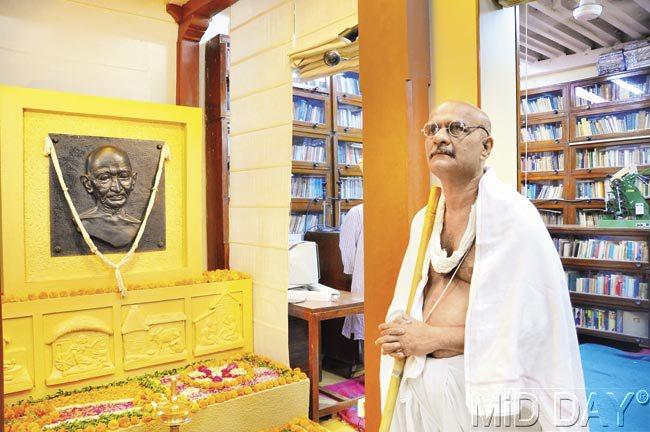The indefatigable 89-year-old Sahitya Akademi award-winning Gujarati writer, Dhiruben Patel, pens a play on the predicaments of senior citizens. The Lekhini literary group of women writers, which Patel founded 40 years ago, mounts the production. As first-time actors bring the script to life, a dramatic sequence of events unfolds

Sahitya Akademi award-winning Gujarati litterateur Dhiruben Patel trusts the wisdom locked in the fable of an Arab, who was pushed out of his tent by an overstepping camel.
ADVERTISEMENT

A scene from Aarab Ane Oot, which means the Arab and the Camel. Pics/Ronak Savla
Patel uses the metaphor to caution senior citizens against encroachments of their children. In her farm-fresh two-act play, Aarab Ane Oot (The Arab and the Camel), Patel makes a case for senior citizens' right to an independent life. She warns against invasion of privacy, done in the name of joint family love.
Non-traditional
For an 89-year-old writer, Patel makes a daring, non-traditionalist statement. Her stance contradicts the politically correct, oft-repeated conservative worldview where older people are meant to be coopted in a large happy joint family.

Dhiruben Gordhanbhai Patel
In a country where a decisive segment of the entertainment industry equates the 'big Indian family' with the 'great Indian culture,' Dhiruben Patel offers a fresh perspective.
Viewpoint
"I think older people too deserve their space, which is often denied to them. In cities like Mumbai where the real estate prices are ever on the rise, older citizens' prime properties stand at a higher risk of being whisked away for wrong emotional reasons," says Patel who feels that senior citizens shouldn't be made to feel guilty if they express their desire to live their lives on their own terms. "Care and control are not synonymous concepts. Senior citizens are often controlled and once they give in, they become unwelcome guests in their own homes."
Liberty
Those who are familiar with Dhiruben Patel's diverse bi-lingual (Gujarati and English) literary works — novels, poetry (Kitchen Poems), translations (rendering The Adventures of Tom Sawyer in Gujarati), lyrics (Bhavni Bhavai), TV and radio serials and children's stories — can appreciate her progressive take in Aarab Ane Oot.

Dhiruben's parents were Gandhians. The freedom struggle marked her childhood
Much unlike the populist and mainstream notion of "happily living together," her world view respects individual space. The play reflects her belief in individual liberty and free will.
It complements her earlier body of work which honours individual choices. While her novel Andhali Gali (The Blind Side Street) is about a lonely woman's decision to marry at the age of 45; Vadvanal is a psychological insight into the diary of a woman who commits a murder; Waansno Ankur is about a boy's inheritance of his mother's rebelliousness. (It was prescribed as a textbook in eight universities.)
Her celebrated play Agantuk (rendered in English as Rainbow at Noon and turned into a Gujarati play by Naushil Mehta), which won her the Sahitya Akademi Award (2002), is about a hermit who returns to domestic life. Her superb analysis of women populating the Gujarati novel forms Kadambarini Maa.
Praise
The editors of the Handbook of Twentieth-century Literatures of India praise Patel. "In her writings, Dhiruben reveals her understanding of the human mind. She builds up the characters and situations, forming a natural pattern. She writes with ease and a sense of humour, encompassing in her works the lives of men and women and at various levels."
Sensitivity
It is her sharp appreciation of reality that has won acclaim. At one point in her writings, she had said, "I firmly believe that sensitivity is the first and the last requirement of a writer. It is of no importance whether the writer is a man or a woman." In the latest play, Aarab Ane Oot, she treats the subject with the same sensitivity.
"Man, woman, young or old, we should be able to exercise our will," feels Patel whose play revolves around a matriarch who stops her children from taking over her property. She prefers to live alone. While drafting her will, she gives equal shares to her daughters, sons and service care giver.
"Giving equal share to the daughters is not a common practice in a Gujarati household setting. Laws of inheritance remain on the paper and people never remember their daughters during property distribution." Patel feels the play should be a starting point for a dialogue on inheritance laws.
Roots
Patel's belief in gender equality and individual liberty visible in Aarab Ane Oot has strong roots in her own life spanning eight eventful decades. Born (1926) to educated and exceptionally progressive parents, Dhiruben enjoyed a rare childhood and adolescence in the thirties and forties.
Growing up in the lush green suburb of Santacruz with sprawling rice fields, she spent most of her schooling years in her home compound (Hansrajwadi, where she stays till date). Long morning walks to the beach to see the fishermen at work was a source of joy for young Dhiru.
The family went for weekly picnics, in which she and her two older brothers were encouraged to absorb nature's splendour. On one such picnic, she developed a special bond for the Madhumalti flower tree.
Reading
Her father Gordhanbhai Patel, a journalist with the Bombay Chronicle, allowed her reading time, gifting her one book every day after she returned from Poddar school.
The hours spent in reading were never rationed, right up to the time she post-graduated in English literature and later taught the subject in Bharatiya Vidya Bhavan. In what seems radically liberal even by today's standards, the father did not raise any objection to any of her lifestyle choices.
Her mother Gangaben was a social worker and founder of social organisations like Stree Mandal, Santacruz. She was a member of the All India Congress Committee. Congress leaders, academics and writers of that era often met at her residence. Being a staunch follower of Mahatma Gandhi, she was part of most of his non-violent protests.
She was arrested six times by the British. As she served her jail terms, her husband not only supported her morally, but also took care of the family and cooked meals. Dhiruben Patel was a happy witness to her parents' unusually equal relationship. Their belief in India's freedom movement impacted her at an early stage, which explains her lifelong embrace of khadi as a symbol of national pride.
Opinion
Landmark anthology Women Writing in India: The Twentieth Century (edited by Susie J. Tharu, K Lalita) makes a special mention of Dhiruben Patel's formative years which made her the outstanding writer that she ultimately became.
"It is a tribute not only to her remarkable family, but to the Gandhian movement as a whole, that no pressure was put on Dhiruben when she decided not to marry."
Dhiruben Patel lived in a world where her opinion was factored in, even in small matters like piercing of her ears. She had the full independence to move around in the city. She knew she wanted to be a writer. From the age of six, she sent reminder notes to her grown-up self, requesting her to write for children.
Publishing
By 1963, Dhiruben Patel had half a dozen books to her credit. She floated two publishing houses despite losses; worked as the founder editor of the Sudha women's weekly.
Incidentally, she was denied a byline when she started as a contributor for the magazine edited by her mother. Her stories were used as fillers and she was advised not to seek fame at a very early age.
Mumbai
Dhiruben Patel's literature wears a distinctly Mumbai texture, which is also evident in the latest play. Set in a Juhu Vile Parle Development scheme bungalow, the drama uses the backdrop of Mumbai's prime plots.
Property handover is one of the dominant themes in the script — a natural reflection of the current mood in the city where older locales are being 'redeveloped' to suit a spruced up neighbourhood. Patel understands the 'redevelopment' logic in its entirety.
"I am not as mobile as I was at one point. But I have kept tabs on the city's changing skyline and its glitzy malls. The change is a bit too fast."
Concern
An aspect of the change and disconnect in the city has been correctly captured in Patel's popular play, directed by Manoj Shah, Mummy! Tu Aavi Kevi. Its 55 shows have been performed in Gujarat and Maharashtra.
Though set in a Gujarati household, it tells the universal story of a convent school-educated English-speaking generation which is losing its connection with its mother tongue.
The English speakers are embarrassed by their 'not-so-happening' linguistically-challenged pedigree. Urbane children, who are losing cultural roots, are a concern for Dhiruben Patel.
Bonds
Despite her concerns for the city's loss of linguistic identity, Dhiruben Patel holds a positive view of things. Her faith in Mumbai's porousness reflects in her efforts to remain part of cultural groups — oases of hope — that forge new bonds.
The Lekhini literary group, which she founded 40 years ago, is one such oasis which retains her trust in civil society initiatives and literary exchanges with emerging writers. No wonder she responded to Lekhini's request for a new script and wrote the play in a record four days.
Write
After the Diwali issue of the Lekhini magazine won the Gujarat Sahitya Akademi grant, the group invested it into an intellectually-stimulating activity. "We requested her to write for us. To work on a script of our celebrated Dhiruben was an honour.
Her novels and plays have inspired and educated us for generations," recalls Dr Preeti Jariwala, the director of Aarab Ane Oot, who also plays the role of a maidservant. An Ayurvedic doctor by profession, she is a published writer, with a childrens play to her credit.
Like Dr Jariwala, other members of the Aarab Ane Oot cast have written travelogues, short stories and poems. The Lekhini forum encourages women to seek enrichment in writings on all and sundry subjects, keeping away from four digressions (as written in their charter) Food, Figure, Fashion and Film.
Subjects
After the experimental show of Aarab Ane Oot, does Dhiruben Patel want to see its commercial production? "I don't want to track its future. A playwright should move on immediately after the script is handed over to the director.
I am just happy about the on and off-stage dialogue it has generated," she says with characteristic detachment. "Climate change, international treaties, fall and rise of the rupee, wars civil and uncivil," (quoting from Kitchen Poems) one wonders which subject will now play the muse.
The writer is a Mumbai-based cultural chronicler.
 Subscribe today by clicking the link and stay updated with the latest news!" Click here!
Subscribe today by clicking the link and stay updated with the latest news!" Click here!






